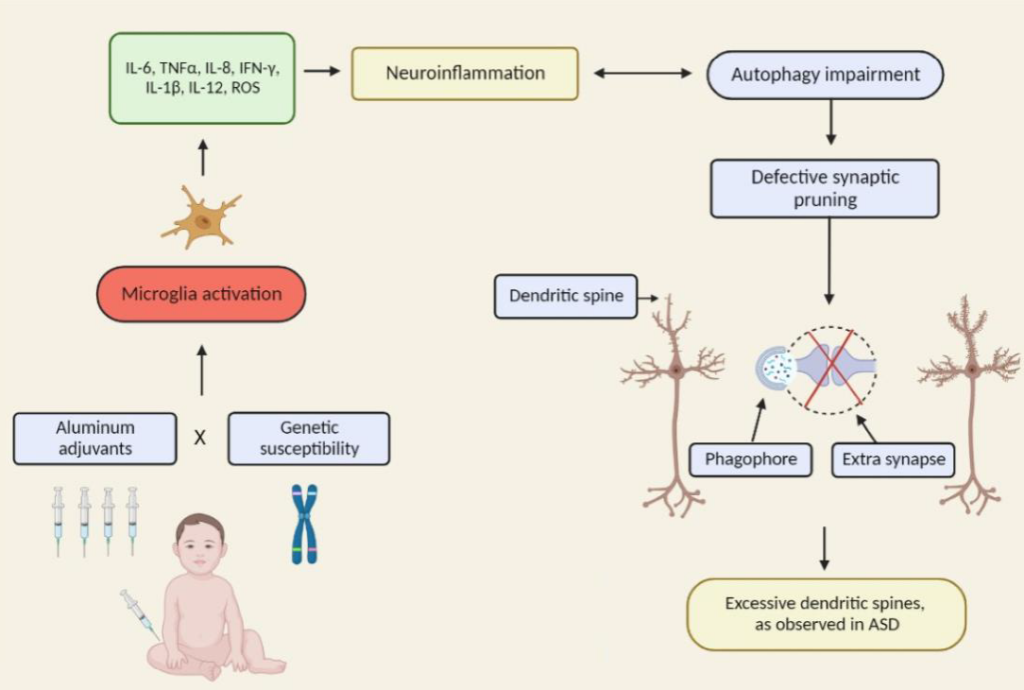Inflammation and Autophagy: A Convergent Point between Autism Spectrum Disorder (ASD)-Related Genetic and Environmental Factors: Focus on Aluminum Adjuvants
Toxics 2022 Aug 31;10(9):518. doi: 10.3390/toxics10090518.
Loïc Angrand 1 2 3 4 5 , Jean-Daniel Masson 1 2 , Alberto Rubio-Casillas 6 7 , Marika Nosten-Bertrand 3 4 5 , Guillemette Crépeaux 1 2
Affiliations
1 Univ Paris Est Créteil, INSERM, IMRB, F-94010 Créteil, France.
2 Ecole Nationale Vétérinaire d’Alfort IMRB, F-94700 Maisons-Alfort, France.
3 INSERM UMR-S 1270, 75005 Paris, France.
4 Sorbonne Université, Campus Pierre et Marie Curie, 75005 Paris, France.
5 Institut du Fer à Moulin, 75005 Paris, France.
6 Biology Laboratory, Autlán Regional Preparatory School, University of Guadalajara, Autlán 48900, Jalisco, Mexico.
7 Autlán Regional Hospital, Health Secretariat, Autlán 48900, Jalisco, Mexico.
Abstract
Autism spectrum disorder (ASD), schizophrenia, and bipolar disorder are genetically complex and heterogeneous neurodevelopmental disorders (NDDs) resulting from genetic factors and gene-environment (GxE) interactions for which onset occurs in early brain development. Recent progress highlights the link between ASD and (i) immunogenetics, neurodevelopment, and inflammation, and (ii) impairments of autophagy, a crucial neurodevelopmental process involved in synaptic pruning. Among various environmental factors causing risk for ASD, aluminum (Al)-containing vaccines injected during critical periods have received special attention and triggered relevant scientific questions. The aim of this review is to discuss the current knowledge on the role of early inflammation, immune and autophagy dysfunction in ASD as well as preclinical studies which question Al adjuvant impacts on brain and immune maturation. We highlight the most recent breakthroughs and the lack of epidemiological, pharmacokinetic and pharmacodynamic data constituting a “scientific gap”. We propose additional research, such as genetic studies that could contribute to identify populations at genetic risk, improving diagnosis, and potentially the development of new therapeutic tools.
Excerpts:
“As a result of these pieces of evidence (epidemiological, clinical and preclinical data) pointing to a potential causal association between early ABA (aluminum-based adjuvants) exposure and increased ASD risk, new hypotheses regarding neurological and immunological consequences of ABA-containing vaccines and novel clinical strategies (i.e., postponing of ABA-containing vaccines and replacement of ABAs with calcium phosphate are now being considered.“
“Our review presents the lack of fundamental scientific data demonstrating that Al adjuvants are safe and do not induce any long-term side effects. It also supports further investigation related to the effects of early Al adjuvant exposures occurring in combination with genetic susceptibility factors, including autophagy, immune and inflammation process genes. As accumulating evidence shows that modulating the levels of autophagy may increase the risk of NDDs, such studies will elucidate a new etiology for these complex disorders and contribute to develop potential new diagnostic and therapeutic tools.”

